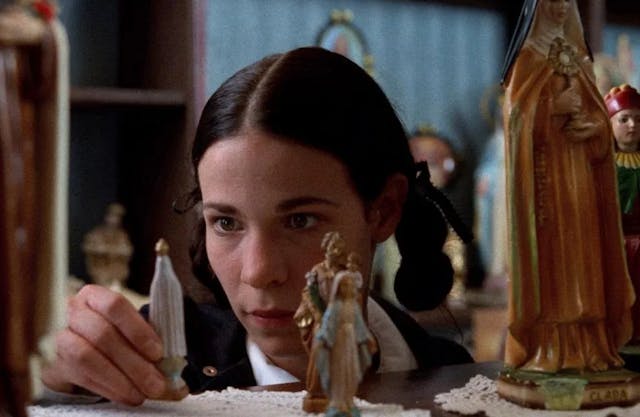
Nice access, if you get it: the crowds gather at the Egyptian Theater, epicenter of the Sundance Film Fest / Photo by Maya Dehlin, courtesy of Sundance Institute.
Our coverage of the 2024 Sundance Film Festival hit a snag when the organizers diminished virtual coverage. This year, there were fewer spots available. Those lucky to get accreditation had to conform to reduced access. The availability of streamed films was delayed and limited to the final days of the event. The back-down from the virtual model imposed by the pandemic inches back to the old days when attendance was mandatory to cover the Festival. Walking the snowy streets of Park City must be nice, but it is very expensive. It’s heartening to see a progressive institution like Sundance abandoning a more democratic policy of access in favor of the old ways, where bigger outlets and better-established freelancers get the spoils while alternative voices get shut out. It's not a good look for the most progressive of film festivals. It’s very, very anti-indie.
Still, we managed to jump through hoops to catch some of the films in competition. Check out our first impression of some documentaries that should go on the watchlists of every self-respecting movie buff. Not a dud in the bunch!
Eternal You
German directors Hans Block and Moritz Riesewieck broke through in 2018 with “The Cleaners,” a documentary about the industry that arose around the need to rid the internet of questionable - or inconvenient - information. Six years later, they return to Park City with a chilling exploration of how Artificial Intelligence is used to create “Thanobots,” that is, a virtual facsimile of your loved ones so that you can keep chatting with them after they die. It sounds like a lark. Take some texts and emails - and your digital footprint, if you want to be through - feed it to the software, and you can dispose of the Ouija board.
It would be easy to take the sensational route, but the filmmakers are out for something more complex. They are emphatic with the desperate people who want to ease their grieving through technology. We follow a man who can’t let go of his girlfriend, and a woman who faces the criticism of her extended family after exposing them a chat with her virtual, deceased father. It’s heartbreaking, but you can see some concerns creeping in as the technology becomes more complex. Academics and ethicists are on hand to balance the glee of the startup cowboys pushing the technology forward without stopping to ask uncomfortable questions.

Baby Avatar: A cute AI baby stares down mortality in "Eternal You" / Photo courtesy of Sundance Institute.
Any qualms you have about AI will be justified by “Eternal You.” The movie feels ripped from the headlines. You see embattled OpenAI CEO Sam Altman testifying in front of a US Congress Committee, taking tech companies to task over the unchecked development of the technology. The exercises of digital resurrection become more troubling as they increase in sophistication. The movie culminates in South Korea, where a TV show provides a grieving mother the chance to say goodbye to her dead daughter. The catch is that the moment is turned into a public spectacle. A production team creates a virtual avatar of the girl, places her in a bucolic kiddie paradise, and brings the mother into a green-screened studio to film her interacting with the digital ghost. You can imagine Mark Burnett cold-calling the producers to buy the rights for an American remake coming soon to a streamer near you.
“Eternal You” is not anti-technology, but it’s not a piece of techie propaganda, either. It balances the sense of wonderment with a sober contemplation of what makes us human and mortality's place in our lives.
And So It Begins
Here’s hoping a US distributor releases Ramona S. Diaz's eye-opening documentary before the 2024 presidential elections. The filmmaker drops us in the Philippines, right in the middle of Leni Robredo’s 2022 presidential campaign. With strongman Rodrigo Duterte’s time leading the country coming to an end, the congresswoman aims to correct the country's course after years of fear-mongering, suppression of civil liberties, and crackdown on freedom of expression. In a parallel storyline, journalist Maria Ressa, founder of the independent news website Rappler, navigates this transitional moment as an even bigger threat looms on the horizon.
Thirty-six years after the fall of dictator Ferdinand Marcos, the frontrunner in the presidential contest is Ferdinand “Bongbong” Marcos Jr. His mother, the infamous Imelda Marcos, looms large in the campaign. In a perfect storm of totalitarian outreach, his Vice Presidential candidate is Sara Duterte, the daughter of the exiting president. Robredo is actually the underdog in the contest, with a progressive campaign that props up civility and inclusion. The LGBTQ community has a major role in her political rallies - a dancer does a serviceable version of Tina Turner’s “Proud Mary,” fringed bodysuit included.

Pink Revolution: Leni Robredo campaigns for the presidency in the Phillippines in "And So It Begins." / Photo by Cine Diaz, courtesy of Sundance Institute.
You could say the sons and daughters of true-blue and wanna-be dictators are not guilty of their father’s sins. However, the gleeful rewriting of history tips their hand. Activists and people on the street gleefully celebrate a second coming of the Marcoses, outright denying the brutality of the regime. Between 1971 and 1981, Ferdinand Marcos placed the country under martial law to solidify his hold on power and squash dissent. The Marcoses presided over more than 3 thousand murders, 35 thousand documented cases of torture, dozens of disappearances, and thousands of illegal detentions. These are not opinions. These are historical facts. How can people forget? That’s where propaganda and disinformation come in. Diaz takes us to a museum at the Marcos’ country house, where you will find no mention of Martial Law and its victims. When the solicitous guide is asked about the erasure of the episode, he sheepishly reacts by saying the place is meant to celebrate Marcos’ “achievements.”

Press under siege: journalist Maria Ressa fights for freedom of the press in "And So It Begins" / Photo by Cine Diaz, courtesy of Sundance Institute.
The filmmaker does not preach to us about right and wrong. She just lays reality bare before us. You get the agony and the ecstasy of fighting the good fight. We witness the moment Ressa gets the news that she was awarded the Nobel Peace Prize, as well as a chilling raid to her newsroom. We see Robredo’s grassroots movement growing. At least, that’s the impression we get from the multitudinous campaign events. By now, we know the outcome. Diaz is not pessimistic, but “And So It Begins” plants the uneasy feeling that, at times, citizens can be their own worst enemy.
Igualada
If the Leni Robredo saga brings you down, you will find an upper in Juan Mejía Botero’s “Igualada.” The movie follows the unlikely campaign of Francia Márquez, the first Afro-Colombian woman to start a presidential campaign in the South American nation. Botero strikes documentary gold, using extensive archival material of Márquez in 2009 when the news-making turn she took was nowhere in sight. We see her as a single mother in rural Colombia, struggling to make ends meet as she dedicated her life to fighting the government outreach that threatens to displace her community to take control of communal lands that hold reserves of gold. Add to the perils the ever-present threats of violence from paramilitary groups.

"Igualada," and proud of it: Francia Márquez defies Colombian politics as usual in Juan Mejía Botero's documentary. / Photo by Darwin Torres, courtesy of Sundance Institute.
In a parallel timeline, we see middle-aged Márquez struggling to push forward her campaign and navigate the labyrinth of Latin American politics, a minefield of fear-mongering, upper-class privilege, and racism. The movie’s title is an insult deployed by the privileged against those who think and behave like they are “equal” to them. Márquez - and Botero - take it on as an honor badge. The movie is a celebration of Márquez’s chutzpah. As much as you can enjoy it, it is more interesting when it deals with the pitfalls of engaging in politics. Check out the scene where she arrives at a rally to discover the place is deserted. Her inexperienced team has been incapable of properly coordinating the event. There is also a more interesting story tracking the compromises that eventually led her to take the Vice Presidential candidacy on a ticket with Gustavo Petro, who eventually won the 2022 elections. Márquez made history. Can she keep her integrity intact in power? We should get a sequel.
Dig! XX
Party like it’s the late nineties, early aughts! Taking a page from recording artists, director Ondi Timoner gives us a XX Anniversary restored, remixed, expanded version of her Sundance Grand Jury Prize-winning documentary. Originally released in 2004, “Dig!” contemplated the friendship & rivalry between two charismatic indie rock artists: Anton Newcombe of The Brian Jonestown Massacre and Courtney Taylor of The Dandy Warhols. The movie was an engrossing human drama about the creative life and a fascinating dissection of the music business. We see Taylor thrive thanks to ruthless discipline while Newcombe flounders in the throes of addiction and self-sabotaging behavior.

"Dig!" It: The Dandy Warhols' Courtney Taylor and The Brian Jonestown Masscre's Anton Newcombe in Ondi Timoner's restored and expanded doc. / Photo courtesy of Sundance Institute.
“Dig! XX” is, in essence, the same movie, with about 40 minutes of new scenes and performances split into the existing movie. I watched the original and the new version back-to-back. The never-before-seen material adds context, color, and rebuttals. Some scenes are longer and better for it. We hear an atomic diss to "Hottie and the Blowfish" - you understand why they left it out. In 2004, it would have alienated some audiences. In 2024, it's a passé reference. Hootie and the Who? The expansion includes new bits of narration from BJM’s Joel Gion, who alternates with Taylor as narrator. There’s more information on the tempestuous romantic life of Newcombe and the fiery, violent outbursts that periodically shifted the band’s lineups.
Some jokes and asides get an extra kick when we get to see snipers of advertisement to which the interviewees allude - a Dandy member dismisses the expensive video clip Capitol Records finances as “an ad for Dep.” - contemporary audiences do need to see a bit of the ad to know it was a hair-styling gel, and understand the scope of lameness the artist decries. An infamous fight during a BJM concert gets restaged in an episode of “The Gilmore Girls.” Regretfully, they did not manage to insert a bit of Tom Hulce in “Amadeus” (Milos Forman, 1984), so the young ones will not appreciate how true-to-life Taylor’s imitation of the manic laugh is.

Hazards of the heart: in a new scene, actress Tara Subkoff reflects on her breakup with Anton Newcombe in "Dig! XX" / Photo courtesy of Sundance Institute.
The best addition is a chance of a rebuttal offered to original Dandy’s drummer Eric Herford. In the first “Dig!,” Taylor colors his exit from the band as an unmeritorious money grab. The frontman says he cuts his writing royalties in half to share the benefits with the band. Because we don’t hear Hedford’s side, we take that as an unquestionable truth. In “Dig! XX,” Herford gets to say is his piece - spoiler alert: He says “no,” Taylor never did that. It’s a small, throw-away moment, but this is where Timoner movie is at its best, in both versions, when it pierces through the bullshit and the self-constructed illusions of the artist’s life and shows us the messy, unvarnished truth of fallible human beings making a living in a ruthless creative industry.
“Dig! XX” feels more fleshed out and leisurely, but as it closes, you kind of wish it were more of a sequel. The movie business as changed a lot in these 20 years. We might understand how artists transition from kings of the zeitgeist to nostalgia acts, but it would be fascinating to see the process upfront. We get an update on the major players, but it really leaves you wanting more. The good news is that you don’t have to wait for “Dig! XX” to hit theaters to enjoy this fantastic time capsule. The original “Dig!” is available to stream for free on Popflick. See it now, and watch it again when the new version opens. It’s what a true fan would do.
Watch “Lonely”
“Lonely” is a powerful reminder that no one is ever truly alone, and there is always someone out there who cares and wants to help.
Stream NowWant to get an email when we publish new content?
Subscribe today




























